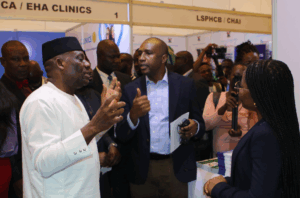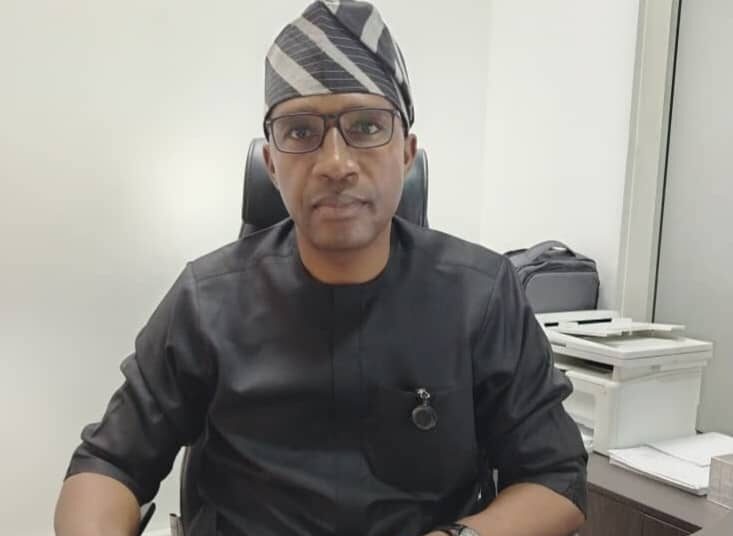INTRODUCTION:
In this interview, a seasoned public health expert and Country Director of the Palladium-led Data for Implementation (Data.FI) project, Otse Ogorry shares insights on why quality data, strong digital infrastructure, local innovation, and electronic medical record system, are essential to building a resilient health system in Nigeria. As the government moves forward with the Nigeria Digital in Health Initiative (NDHI), Ogorry explains how data and technology, when used right, can transform care, close gaps, and put patients at the center of healthcare. MARK ITSIBOR presents the excerpts:
BODY OF THE INTERVIEW:
The Federal Ministry of Health recently released the draft version of the National Enterprise Architecture for Digital Health in Nigeria during a stakeholders’ workshop in Abuja Nigeria. Kindly appraise this document and how this initiative is designed to enhance accessibility, efficiency, and quality of healthcare services, especially as it seeks to address one of Nigeria’s key challenges – health data.
The Nigeria Digital in Health Initiative is a welcome development, as it shows positive positioning by the government. Its unique importance lies in the fact that it aims to build a unified, interoperable health information structure that supports data exchange, healthcare workers, and patient care, ultimately improving health outcomes for all Nigerians. I am particularly pleased because it will help to enhance healthcare access and data, and enable the exchange of health data between disparate systems, ensuring seamless communication based on standardized languages. The initiative also prioritizes the patients ensuring that all measures taken will be of direct benefit to them. The initiative is designed to create a system that caters to the needs of stakeholders, has an architecture that can integrate with existing systems in Nigeria, and remains flexible enough to accommodate future advancements in technology.
The initiative is also being developed with scalability in mind, ensuring that it can be expanded and in the long run, all healthcare facilities in Nigeria can be brought on board. Looking at the draft document that was shared in the stakeholder’s meeting you mentioned, the way the government intends to achieve the goal of the NDHI is the establishment of a National Digital Health Architecture, which will facilitate the creation of a framework for seamless data exchange across health facilities, ensure efficiency in our health systems, and ensure evidence based, data-driven decision making among other anticipated successes. In my opinion, I believe the government is taking the right steps, and we are highly optimistic about this initiative and the leadership being provided. We are confident that the government is heading in the right direction, and we stand ready to support this initiative.
At the NDHI stakeholders’ workshop that was organized by the Federal Ministry of Health in Abuja, you made key points during a panel session that you participated in on the importance of digital health records for Nigeria. Kindly talk us through it.

The meeting focused on critical issues for the Nigerian healthcare system which included the need for high-quality health data, that is talking about data that can drive informed decision making and strengthen the health system. While we acknowledge that the government is doing a great job, we also recognize that it cannot achieve this alone. That is why the workshop brought together diverse groups of stakeholders including state government representatives, donor partners, digital health experts, development partners like the Palladium-led Data.FI project, and others to discuss ways to advance the health system.
A particularly encouraging development is that many of the initiatives outlined in the government’s presentation are already being implemented by Data.FI, a project I currently lead. One of our flagship contributions is the support and expansion of the LAMISPlus electronic medical record system. Originally developed for the HIV program, LAMISPlus has evolved over the years, thanks to past funding, to include modules for other disease areas as well.
LAMISPlus is an open-source software built on standardized, interoperable frameworks that enable seamless communication between different systems. It aligns with the government’s proposed framework, and it is designed with a modular architecture that allows for flexibility and scalability. To illustrate this modularity, I am talking about; imagine LAMISPlus EMR as a large house with 20 rooms, though only five are currently in use. Each room represents a health service module like HIV treatment, tuberculosis treatment, hepatitis management, and so on. As the need grows, more rooms (or modules) can be added as needed without the need to redesign the whole house or altering the structure of the house. This reflects the modular architecture of LAMISPlus, allowing it to be adapted and expanded over time.”
During the workshop, a government representative emphasized that the National Enterprise Architecture for Digital Health would prioritize modularity and open standards. Other key features would include an infrastructural layer, terminology services, data exchange standards, common registries among others. All these requirements are currently the framework which the LAMISPlus operates on.
When Palladium/Data.FI assumed the management of the LAMISPlus around 2020, we transitioned if from a desktop application to a web-based, open-source platform. We also established a vibrant community of practice, bringing together users and contributors from the government, the private sector, development partners, implementing partners, and academia. This collaborative network facilitates continuous feedback, system improvement, and innovation. Academic institutions also contribute fresh ideas and innovations to further expand the system.
What excites me most is that LAMISPlus is a homegrown system, developed by Nigerians, for Nigerians, with our unique healthcare needs in mind. Moreover, we are in the process of making it a global good, which means we are working to expand its application beyond HIV and Nigeria, making it accessible to other countries and applicable to additional disease areas.
In essence, everything we are doing with the LAMISPlus as I have described, aligns closely with the goals of the National Digital Health Architecture. Palladium/Data.FI, through the LAMISPlus system, is well-positioned to collaborate with the government in rolling out this initiative and we are committed to continuing our collaboration to build a stronger, data-driven health system for Nigeria.
How feasible is this electronic data record initiative in Nigeria considering our peculiarities, especially infrastructure deficit, internet penetration and the level of illiteracy? Don’t you think those and even more would hinder its deployment or implementation?
You raised a very important point about infrastructure, like electricity and internet access, and whether digital records can realistically work in Nigeria. I believe they can.
For instance, during the last election cycle, we saw how active Nigerians were on social media. That shows a growing level of digital literacy. There’s also a major government initiative underway to roll out about 14,000 kilometres of submarine internet cables to improve nationwide internet connectivity. Combined with support from telecom companies and private providers, this creates a promising digital ecosystem. On electricity, there is the option of utilizing solar energy and inverters to help solve the challenge of low or lack of power supply to these health facilities. Though capital intensive, it is the way to go especially in areas that are not connected to the national electricity grid.
As you know, digital records allow for unified patient information. Unlike paper records, which often result in multiple, disconnected files for a single patient, electronic systems offer a comprehensive view that makes patient management easier. For example, if a patient has malaria, diabetes, and hypertension, a digital record shows all of that in one place. This allows doctors to make better-informed decisions. With the support of the private sector, government and some donor agencies, we see some hospitals in places like Abuja, Lagos, and Port Harcourt that are already 100% paperless, both public and private. We can learn from these examples to scale up. I believe it’s something that has the potential to work in Nigeria.

How would clinicians be able to access unified records or use the platform seamlessly?
Thanks for that important question. The recent stakeholders’ meeting covered this in a group discussion. Currently, each hospital maintains its own records. One challenge we have in Nigeria is that if I visit Hospital A, then Hospital B, and then Hospital C, those records are not linked. The doctor at Hospital A won’t know what happened at the other hospitals unless I tell them, and sometimes, this is not the details that most patients would be willing to divulge.
But with a unified system and a unique identifier, all the other hospitals I have visited and accessed healthcare can be available to the doctors in a secured format so that the doctor on call can make informed decisions. For example, if I had malaria in Abuja in January, then received treatment in Lagos in February and in Makurdi in March for other episodes of Malaria and then to return to Abuja in April where I happen to come down with Malaria again, the doctor in Abuja will be able to see all the treatments I received in those places and make informed decisions on the right prescription based on my history of Malaria. This improves diagnosis and medication decisions and reduces the risk of duplication or conflicting prescriptions. Building the capacity of health workers to be able to use digital systems is very key to the success of this initiative. I will also add quickly here that the NDHA document emphasizes data security and states that access to patient data would be done in a secured format to uphold confidentiality of patient information and minimize data spillage or unauthorized access to patient data.
How can Palladium support integration of the National Digital Health Initiative?
Palladium/Data.FI has been implementing LAMISPlus for over four years in more than 600 health facilities across 17 states in Nigeria. These include primary, secondary, tertiary, public, and faith-based health facilities. We have deep experience implementing electronic medical records at scale. We also have experience implementing health information exchange in other countries and it is this experience and expertise that Palladium can bring to the table when working with the government to implement this initiative.
Our team includes DevOps engineers and business analysts, who are Nigerians, and who write code, fix bugs, and maintain the system. The LAMISPlus is also supported by a community of practice that I mentioned earlier that are on ground to support enhancements and development processes of the system. We also already operate on open standards, which align with National Digital Health Architecture and that will make integration easier once the National Framework becomes operational. I believe that the LAMISPlus system is a “low-hanging fruit” that the government can build on for quick wins. Data.FI has the expertise, the reach, and the readiness to support this national initiative. We’re committed to working with the government to make it successful.
You mentioned that the Palladium-led Data.FI project has been operational for some time now, kindly tell us what Data.FI has been able to do or achieve in Nigeria since the last three years
The Data.FI project implemented by Palladium commenced implementation of activities in Nigeria since 2019, and this is our sixth year of implementation. Over the last three years, we’ve worked with the Federal Ministry of Health, Nigeria Centre for Disease Control, and previously with the National Primary Health Care Development Agency as well as with state governments of Edo, Adamawa, Akwa Ibom, Lagos, Osun, Kano, and Anambra on HIV and TB programs.
During the COVID-19 pandemic, we supported these states in setting up Situation Rooms which are dedicated spaces equipped with relevant data visualization and analysis equipment for data analysis and decision-making. In Edo State, for example, the success of our work and partnership led the former Governor Godwin Obaseki to allocate a larger space for an integrated situation room covering HIV, TB, Lassa fever, and other diseases.
The project also developed a geospatial tool initially used to support scale-up of COVID-19 vaccination in selected states and was also used by the Edo state ministry of health during the Lassa Fever outbreak of 2024. The tool was very instrumental in helping the state reduce the prevalence of Lassa Fever during the outbreak.
In addition to LAMISPlus, we support NOMIS which is the National OVC (Orphans and Vulnerable Children) System, through the Ministry of Women Affairs. We also support various visualization tools used at different levels for data-driven decision-making.
As we round up this interview, I would like to acknowledge that despite past investments, the Nigerian health systems still appear severely challenged and not moving forward as may be anticipated. What do you think is the problem?
The Nigerian health system has faced a lot of challenges and continues to face these challenges. The issues are broad and numerous, but I would like to focus on three fundamental ones. The first is weak infrastructure in the health system. If you travel around Nigeria, you will discover that some of the health infrastructures are dilapidating while others have been completely destroyed. In some health facilities, there is a visible lack of equipment to provide the necessary healthcare to patients. There is the urgent need to invest to build infrastructure, provide equipment, and training for frontline healthcare workers.
The second point is the weak state of our health data information system. We have a weak data collection and reporting system. The Nigerian health data system is largely paper-based and with this kind of system, there are high potentials for errors to occur during data transcription and other record keeping processes. Patient folders can get missing which can lead to the creation of duplicate folders. It can be stolen or even destroyed by fire or other natural disasters and without a backup, patient records can be lost completely. That is why the Nigeria Digital in Health Initiative is a welcomed development. It would help harmonize our data systems, create efficiencies within the system, and help address all the issues previously mentioned and many more.
There is also the problem of inefficiencies in our supply chain which leads to maldistribution of essential drugs and commodities and leads to additional cost to the patients. Our supply chain system needs to be strengthened to ensure optimum performance of our healthcare system.
There are other challenges to the Nigeria health system, but I would like to restrict my response to these three areas that have been mentioned. The government is currently trying, but they can do more to address the issues faced by the common person in accessing healthcare.





